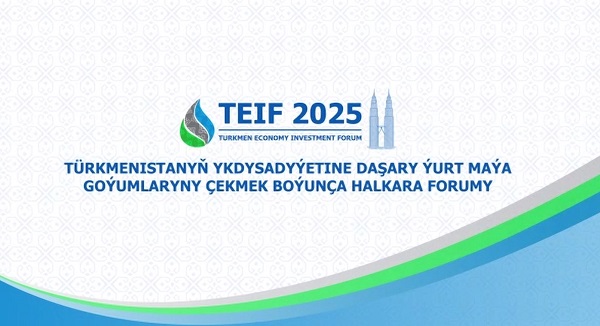In his speech at the International Forum on Attracting Foreign Investments in Turkmenistan’s Economy (TEIF 2025) in Kuala Lumpur, Deputy Minister of Finance and Economy of Turkmenistan P. Yagshiyev emphasized the strategic importance of developing the country’s transport and communication system for regional and global economic partnerships.
Yagshiyev highlighted that Turkmenistan adheres to the principles of peace, trust, equality, and mutually beneficial conditions as the foundation for economic cooperation. These values underpin the country’s economic strategy and investment policy.
Since 2022, Turkmenistan has been actively implementing the Presidential Program for the Development of Transport Diplomacy, aimed at strengthening national transport potential and expanding international cooperation in this sector. Participation in 12 international transport conventions and the initiation of six UN resolutions focusing on the role of transport and transit corridors for sustainable development demonstrate Turkmenistan’s commitment to an active stance on the global stage.
The transport and communication system is a key driver of Turkmenistan’s economic development. In 2024, the transport and communications sector accounted for 9.8% of the country’s GDP, underscoring its significance to the national economy.
Turkmenistan consistently pursues its geopolitical and geoeconomic interests, leveraging its advantageous geographical position and production potential to ensure national development. Particular attention is given to participating in the creation of international transport and transit corridors, which facilitate cargo transportation through Central Asia, stimulate international trade, and drive economic growth in the region.
Given that trade between Asia and Europe represents one of the world’s largest markets, Turkmenistan aims to capitalize on its transit position to attract interregional cargo flows. Investments in the diversification and development of the national transport system—including rail, road, air, and maritime routes—enable the country to effectively integrate into global transport networks and reap significant economic benefits.
In recent years, Turkmenistan has made significant strides in modernizing its railway infrastructure. The railway network now spans over 5,000 kilometers (5,173 km), ensuring reliable connectivity between regions, enhancing transit capabilities, and stimulating economic growth. Plans include further large-scale transformations in the railway sector, such as upgrading rolling stock, depots, and repair facilities, as well as electrifying railways and localizing the production of freight cars and railway ties.
The International Seaport in Turkmenbashi is a critical transport and logistics hub on the Caspian Sea. With a capacity of 17 million tons of cargo annually, it facilitates increased access to global maritime routes and boosts maritime transport volumes. The port plays a pivotal role in developing the Trans-Caspian transport route. Information about the port’s infrastructure has been included in the digital registry of transport and logistics centers for the North-South international corridor, enhancing the efficiency of logistics routes and supply chains.
Turkmenistan has also begun constructing in-demand vessels at the Balkan shipbuilding plant and plans to increase production with investment support.
The development of air infrastructure, including the construction of new and modernization of existing international airports, contributes to the growth of cargo and passenger transportation. The commissioning of the seventh airport in Jebel will increase the total capacity of national airports by 3,800 passengers per hour, creating additional opportunities for tourism, commercial, and cultural exchanges.
Turkmenistan is actively expanding its network of internationally significant highways. The 600-km Ashgabat-Turkmenabat autobahn, which will enhance regional corridors linked to Uzbekistan, is nearing completion. Future plans include the construction of modern highways, such as Ashgabat-Turkmenbashi (approximately 580 km) and Turkmenbashi-Garabogaz (to the Turkmen-Kazakh border), as well as a new road bridge across the Garabogazgol Bay, which will positively impact the development of the North-South international transport corridor.
A key aspect of transport system development is the active adoption of information technologies for managing transport flows, including monitoring and traffic management systems. To stimulate foreign trade, specialized software has been introduced, providing customs authorities with preliminary information on road transport procedures, simplifying border crossings, and reducing border processing times.
In concluding his speech, Yagshiyev noted that Turkmenistan has become an important platform for international dialogue in transport and logistics. In August 2025, the Third Conference on the Challenges of Landlocked Developing Countries, under the auspices of the UN, will be held in the Avaza National Tourism Zone. The forum will bring together representatives from over 30 countries and international organizations. ///nCa, 23 April 2025
